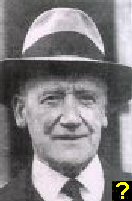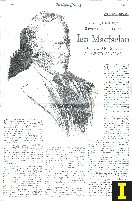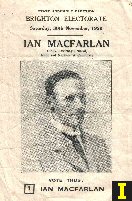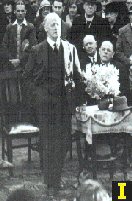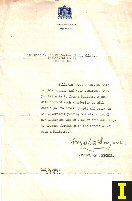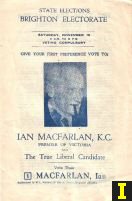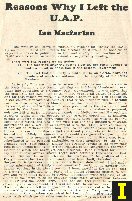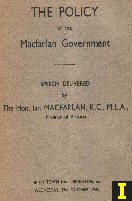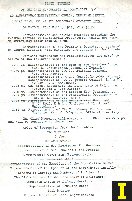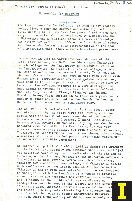Spoken by The Rev C Eadie
Valedictory Address at Funeral of the late
Honourable Ian McFarlan.
The late Honourable Ian McFarlanMacfarlan, to whom we pay respect today, lived a long and diverse and eminently useful life. Meeting him in the last few years, I met a man with very rich memories which reached back to a Melbourne and a University and a Political Scene all very different, not better nor worse, but different,- from those of today. In other words, he was a fair representative of the best of a generation that, sadly enough, has almost passed away.
He was born in 1881 in Carlton and was educated at the local State School, the Melbourne Educational Institute, Scotch College and the University of Melbourne. While at the University he was resident in Ormond College, a point on which he and I found a common interest. It is only in the past few months that some oars he used when rowing with Ormond crews, carrying some now distinguished signatures, went back to the College. It may be of interest to some to know that Ian McFarlan belonged to a very distinguished half-decade in Ormond. The Very Rev Sir Francis Rolland, the late Very Rev. John Flynn,- Flynn of the Inland,- Sir John Dwyer, Chief Justice in WA these many years and a number of other names eminent in the Church, in Law, in Medicine, in Science come to mind right away.
The Law was Ian McFarlan's calling. In that field, after an interruption by the First World War, during which he served with the A.I.F but never went abroad because of: circumstances,- a point of regret, I think, with him,- he made rapid advance. He was still a young man when he was honoured with 'the silk'. His Practise at Law was very diverse, covering most fields, but with a special reference, I believe, to Constitutional Law. It Was through that avenue, I imagine, that he approached public life, being called to serve on various public commisions.
He entered the political field in 1928 as Member for Brighton in the Legislative Assembly and retained that seat until 1945. His abilities were recognised immediately; within six months he was appointed Attorney General in the McPherson Government. Thereafter, he held various portfolios: Chief Secretary, Minister for Electrical Undertakings, and Minister of Health. He himself seems to have looked back on his tenure in the Ministry of Health with most satisfaction. He was involved in that period with the launching of a number of creative enterprises, as the Hospitals and Charities Commission; and, I think, in the fields of things as diverse as Kindegartens and the care of the elderly and the mentally ill. Of special local interest, he was instrumental in obtaining the initial public grants stimulating the interest and concern out of which the recently opened Sandringham District Memorial Hospital has been built & the opening of which occurred only a week since.
For a brief period, in times of no small political commotion, Ian McFarlane was Premier of the State. In 1945 he stepped down from the political scene and thereafter his contribution was through the various commissions and such like in which
his abilities were used. To me, not the least important aspect of Ian McFarlan's public career was in this: that he was one of those who believe that public life demands a complete separation from private enterprise,- in his case, practise at the Law. It is no small thing, but it is sometimes overlooked by the cynical and overly critical, to surrender a lucrative private career and an affluent private life, to undertake a public service, with all that that implies. Be that as it may, I think that the community profited more from the late Ian McFarlan than Ian McFarlan profited from his service to the community.
There is another side to the whole matter,- the private, the personal. All of you who knew Ian MacFarlan as father or friend or colleague, knew him much better than did I. So you come with your own very personal thoughts, to which I can add little.
However, I can say this: In 1919 he married Beryl King, who predeceased him by only a few months, much to his sorrow
and that of many others. He told me frankly, only a few weeks ago, that his marriage was his greatest good fortune,- that and his parentage. His wife was far more than a wife over the space of more than forty years.
And he had sons and grandchildren. For the sons he was grateful and of the grandchildren he was humanly proud. When I talked with him it was not with a politician-statesman but with an old man who had lived his day and was becoming very tired, tired of infirmity. But he always lighted up when talk veered to either one of three points,- his very early days and his days in Ormond, his good wife, and his children and his children's children. He knew what it was to love and he knew what it was to be loved. To have discovered this is to discover everything, or almost everything. It's a good thought to end on. As to his children, one of his sons said to me that he was a good father, a friend and companion, interested and concerned in them, his sons.
Deeper than that, there is the man himself, the individual, the person. We can never do better than guess at the real substance of the other person, the essence, the root of the man. Only God can ever know the final answer to that one. However, I do remember this:
A few weeks ago I talked with Ian McFarlan and he was surrounded by books. (I trust that doesn't hurt, because there may be some here who never want to hear the word "book" again! I don't blame them!). So we talked about books, as we had
done before. And then he said, "Your business is a Book,- not books". That startling remark was accompanied by a rare event,- an oblique, somewhat satirical, legal sort of smile. So I read from The Book. I read from the part of the book
that children of his tradition and generation learned before they learned anything e1se,- the Psalms.
"The Lord is my Shepherd, I shall not want,-".
That day we had no more conversation. He lay back on his pillows and his eyes were looking a long way,- back, I believe, to far-off, distant things, very precious; and, I trust, far forward, to future, hoped-for things, no less precious.
On that note, his own, I conclude this valedictory. He had his regrets,- who hasn't? In that he was like all of us. Unlike many of us, he didn't lay his regrets at anybody else's door. He knew what love is and that he took along
with him. He leaves much behind and for that we can be grateful.
"Requiescat in Pace"!
"May he rest in peace".

